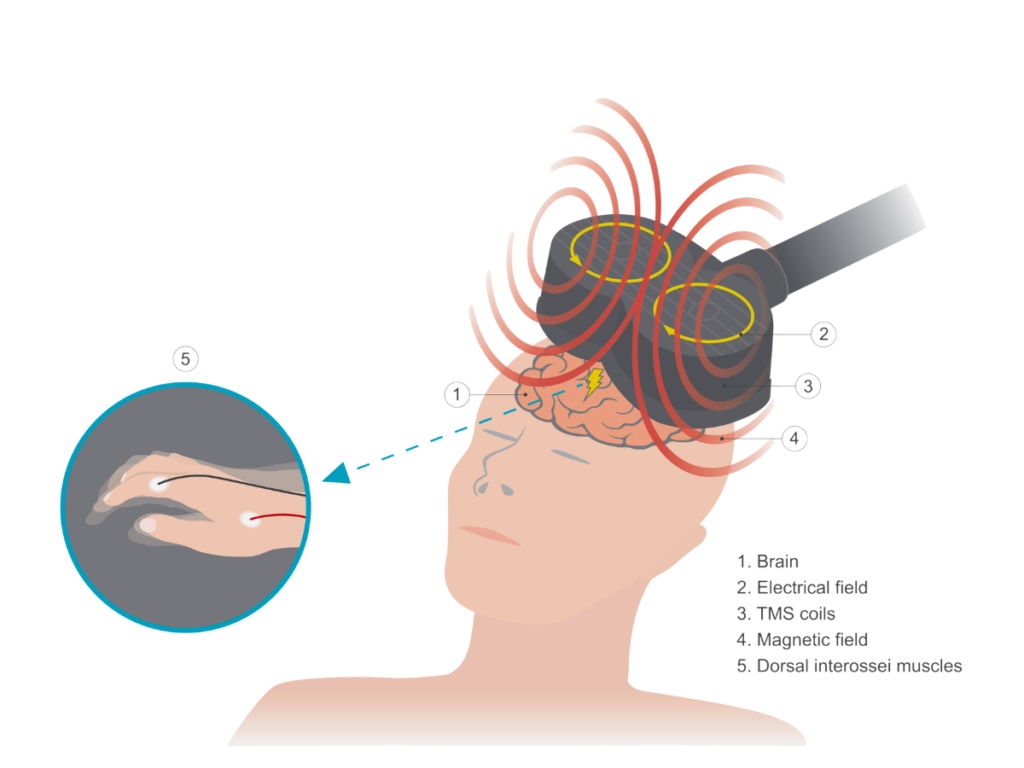Feel Like Yourself Again: How Transcranial Magnetic Stimulation (TMS) at Dr. Fields’ Los Gatos Office Can Help
If you’ve been struggling with depression, anxiety, or other mood disorders and traditional treatments haven’t provided the relief you need, there’s hope. At Dr. Adam Fields’ offices in Los Gatos, we offer Transcranial Magnetic Stimulation (TMS), an innovative and non-invasive therapy designed to help you regain balance and feel more like yourself again. TMS has been a game-changer for many people who’ve found little success with medications or other therapies. Let’s dive into what TMS is, how it works, and what you can expect from this potentially life-changing treatment.
What is Transcranial Magnetic Stimulation (TMS)?
Transcranial Magnetic Stimulation (TMS) is an FDA-approved, non-invasive procedure that uses magnetic fields to stimulate specific areas of the brain associated with mood regulation. It’s primarily used to treat conditions like major depressive disorder (MDD), but it has also shown promise for anxiety, PTSD, OCD, and even chronic pain.

Unlike medications, which work systemically and can cause side effects throughout the body, TMS targets the brain directly, offering a highly focused approach to treatment. Best of all, it doesn’t require anesthesia or recovery time, so you can resume your daily activities immediately after each session.
How Does TMS Work?
TMS uses a device that generates magnetic pulses similar to those used in MRI machines. These pulses are delivered to the prefrontal cortex, a part of the brain involved in mood regulation. In individuals with depression, this area often shows reduced activity. By stimulating this region, TMS can help “reactivate” neural pathways, improving communication between different parts of the brain.
Over time, repeated stimulation can lead to long-lasting changes in brain activity, reducing symptoms of depression and other mood disorders. Many patients report feeling improvements after just a few sessions, with the full effects becoming more noticeable over the course of the treatment series.
Why Choose TMS?
You might be wondering if TMS is right for you. This therapy is often recommended for:
- Individuals with depression who haven’t found relief through medications or therapy alone.
- People who experience intolerable side effects from antidepressants.
- Those looking for a non-invasive, drug-free treatment option.
- People with anxiety disorders, PTSD, or OCD who need a targeted therapeutic approach.
At Dr. Adam Fields’ Los Gatos office, we’ll work with you to determine if TMS is a good fit based on your medical history, current symptoms, and treatment goals.
What Are the Risks?
TMS is considered safe and well-tolerated, but as with any medical treatment, it’s important to understand the potential risks.
Common side effects: These are typically mild and temporary.
- Most of our people experience scalp discomfort or a tingling sensation during the procedure.
- Mild headaches are also common after the first few sessions but usually resolve quickly.
Uncommon side effects: Rarely, patients may experience:
- Seizures, though the risk is extremely low (less than 0.1%)
- Dizziness
- Hearing changes if ear protection isn’t used
- Muscle twitching near the treatment site.
At our office, we prioritize your safety and comfort, closely monitoring you during each session to minimize any risks or discomfort.
Preparing for TMS
Before starting TMS therapy, there are a few steps you’ll need to take to prepare:
- Comprehensive Evaluation: During your initial consultation at our Los Gatos office, Dr. Fields will review your medical history, current symptoms, and past treatments. This helps ensure that TMS is the right choice for you.
- Medication Review: Some medications can affect TMS’s effectiveness, so we may recommend adjustments to your current prescriptions.
- Lifestyle Considerations: Avoid alcohol or recreational drugs, as these can interfere with treatment outcomes. We’ll also discuss any other health considerations to optimize your results.
Scientific Studies for TMS
Transcranial Magnetic Stimulation (TMS) is supported by a growing body of scientific research as an effective treatment for various neurological and psychiatric conditions, particularly major depressive disorder (MDD).
Bipolar Depression and Adolescents: Clinical trials at the Mayo Clinic are exploring the broader applications of TMS, such as treating bipolar depression and assessing its efficacy for adolescents with major depressive disorder. These studies are yielding promising results, particularly for cases resistant to traditional therapies Mayo Clinic.
Treatment for Depression: The National Institute of Mental Health (NIMH) highlights TMS as an FDA-approved, non-invasive treatment for major depression. It works by stimulating specific areas of the brain linked to mood regulation. Recent advancements suggest that mapping individual brain architecture can enhance the precision and effectiveness of TMS by targeting deeper brain structures, further validating its clinical potential National Institute of Mental Health.
Effectiveness in Post-Stroke Cognitive Recovery: A systematic review and meta-analysis published in BMC Neurology evaluated TMS for improving cognitive function in post-stroke patients. It concluded that repetitive TMS (rTMS) showed statistically significant improvements in cognitive performance compared to baseline, with a low risk of adverse effects. This underscores its utility in neurorehabilitation contextsBMC Neurology.
What to Expect: Your First Appointment
Starting a new treatment can feel overwhelming, but we’re here to guide you every step of the way. Here’s what you can expect during your first TMS session:
- Before the Appointment: You don’t need to fast or make major changes to your routine. Wear comfortable clothing and bring any questions you might have.
- Mapping the Brain: The first session involves a process called “mapping,” where we identify the exact location and intensity of stimulation that’s right for you. This involves placing the TMS coil on your head and delivering a few test pulses to find your motor threshold (the minimum intensity needed to cause a muscle response in your hand).
- During the Procedure: Once mapping is complete, the actual treatment begins. You’ll sit in a comfortable chair while the TMS device delivers magnetic pulses to the targeted brain area. The session typically lasts 20-40 minutes. You’ll hear a clicking sound and feel a tapping sensation on your scalp, but the process is generally well-tolerated.
- After the Appointment: There’s no downtime, so you can return to work, school, or other activities immediately after your session. Some patients report feeling a bit tired or having a mild headache, but these effects are usually short-lived.
What to Expect from TMS Treatment
TMS is not a one-and-done treatment. It’s typically administered five days a week over the course of 4-6 weeks, depending on your specific needs. Here’s what many patients experience during their treatment journey:
- First Few Sessions: Some people notice subtle changes in their mood or energy levels, while others may take longer to see results. It’s important to stay patient and committed to the full treatment plan.
- Mid-Treatment: By the second or third week, most patients report significant improvements in their symptoms. You may find it easier to focus, sleep better, or feel more hopeful and motivated.
- End of Treatment: After completing the treatment course, many patients experience lasting relief from their symptoms. For some, periodic maintenance sessions may be recommended to sustain the benefits.
Enhancing TMS with Complementary Therapies
At our Los Gatos clinic, we understand that mental health is deeply connected to physical health. That’s why we offer a comprehensive approach to care, integrating TMS with other proven therapies:
1. Cranial Adjusting
Cranial adjusting focuses on correcting misalignments in the skull and upper cervical spine. These misalignments can impair cerebrospinal fluid flow, contributing to symptoms of brain fog, headaches, and mood instability. By restoring proper alignment, cranial adjusting enhances the effects of TMS and supports overall brain health.
2. Laser Therapy
Low-level laser therapy (LLLT) is another powerful tool in our arsenal. This treatment uses light energy to reduce inflammation, improve cellular function, and promote healing in brain and nerve tissues. Studies have demonstrated that laser therapy can enhance cognitive function and alleviate symptoms of depression and anxiety, making it an excellent complement to TMS.
3. Extracorporeal Shockwave Therapy (ESWT)
Although often associated with physical pain management, ESWT has shown promise in improving brain health by stimulating neural activity and promoting circulation. By incorporating ESWT into your care plan, we aim to address both the physical and neurological components of mental health.
4. Corrective Chiropractic Care
The spine plays a critical role in nervous system function. Misalignments can create stress on your nerves, exacerbating mental health issues. Our corrective chiropractic care addresses these underlying imbalances, ensuring that your body is functioning at its best and supporting your mental health journey.
Possible Results of TMS
The outcomes of TMS vary from person to person, but clinical studies and patient experiences are overwhelmingly positive. Here are some potential benefits you might experience:
- Reduced symptoms of depression, anxiety, or other mood disorders.
- Improved focus, concentration, and cognitive function.
- Better sleep quality and energy levels.
- A greater sense of emotional balance and well-being.
At Dr. Adam Fields’ office, we’re committed to helping you achieve the best possible results. Our personalized approach ensures that your treatment is tailored to your unique needs and goals.
Take the First Step Toward You’re Healing
Living with depression, anxiety, or other mental health challenges can feel isolating, but you don’t have to face it alone. Transcranial Magnetic Stimulation (TMS) offers a safe, effective, and non-invasive way to reclaim your mental health and improve your quality of life.
If you’re ready to explore whether TMS is right for you, contact Dr. Adam Fields’ Los Gatos office today to schedule your consultation. Let us help you take the first step toward feeling like yourself again.
